'Queenie' Author Candice Carty-Williams Only Wants to Tell Authentic Stories
The author and showrunner discusses turning her acclaimed 2019 novel into a Hulu miniseries.
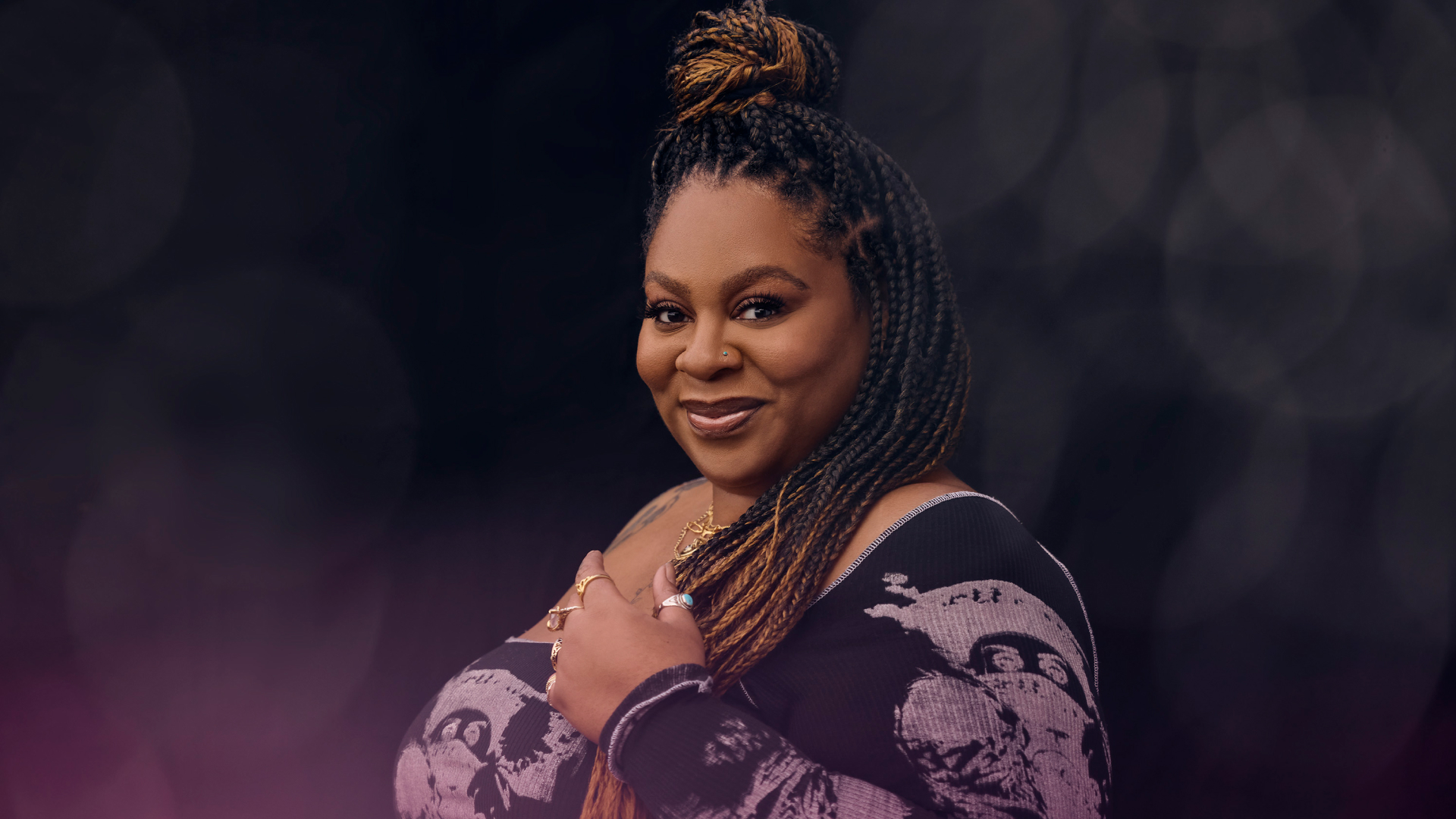
When Candice Carty-Williams published her debut novel Queenie in 2019, the book about an imperfect 20-something Jamaican-British woman truly changed her life. Countless women connected with the titular character’s struggles with working, dating, and maintaining her friendships and mental health while reeling from her first major heartbreak, and it quickly became a critical and commercial success. Now, five years after becoming an overnight sensation in the publishing world, Carty-Williams is also an exciting new voice in the television role, bringing Queenie to the small screen as a Hulu miniseries (premiering on June 7).
“If you'd asked me at the start of my journey when I first started typing out the character Queenie sitting in the stirrups, where I would be in nine years, I wouldn't have said this at all,” the author tells Marie Claire. Despite her lack of expectations, Disney’s Onyx Collective, which produces projects from creators of color, helped her to helm the story into an eight-episode Hulu original.
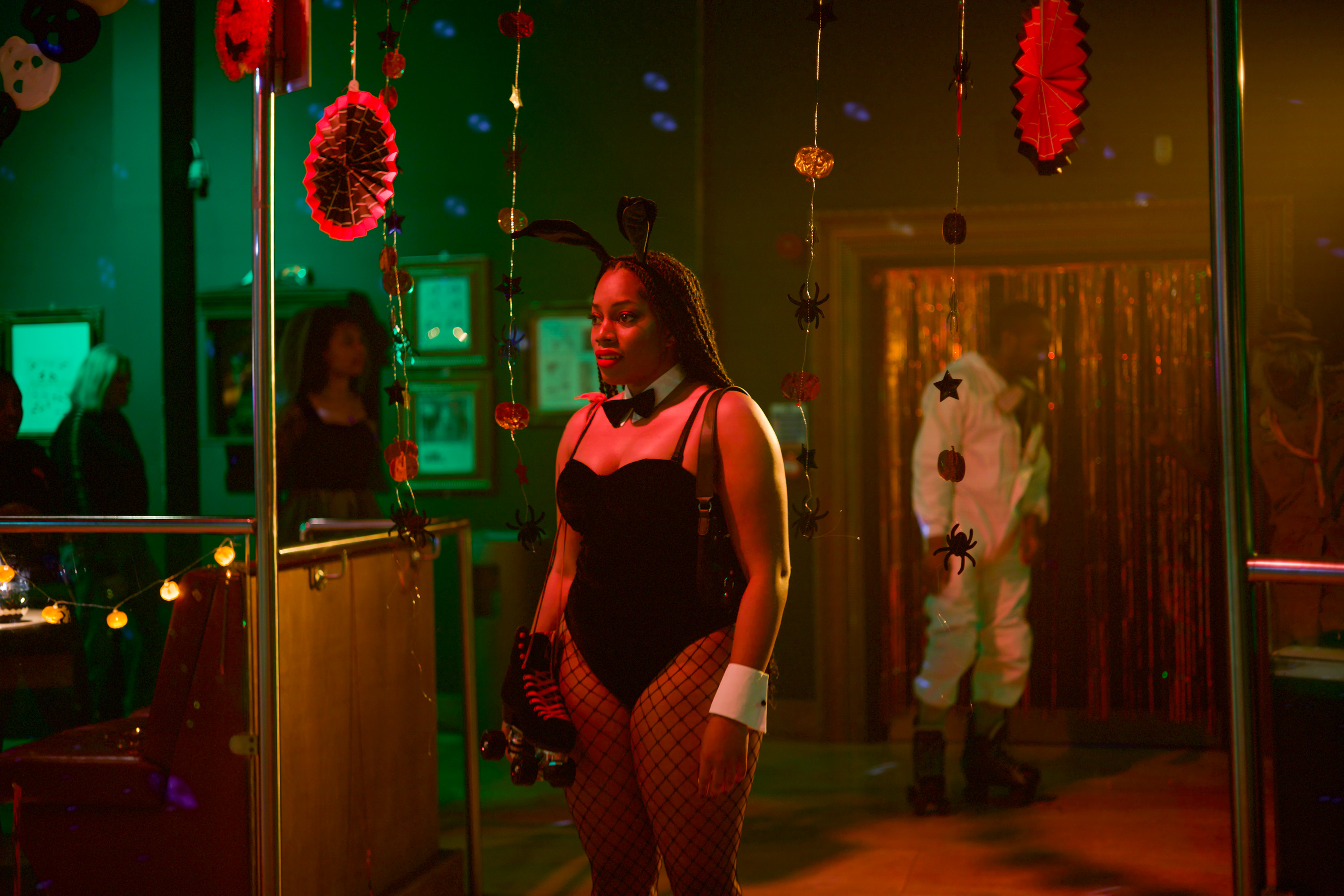
Dionne Brown in Queenie as the titular 20-something navigating life after the end of her three-year relationship.
Queenie marks Carty-Williams’ second stint as a showrunner and creator after her BBC musical-drama Champion premiered to rave reviews last year and later landed on Netflix. Even with just two shows under her belt, it’s clear that Carty-Williams is dedicated to bringing authentic characters and underrepresented themes to the screen while paving the way for more POC creatives. “Across all arts, all news outlets, everything really, I think that we still need greater representation of everybody in these spaces,” she says. “Fingers crossed that will happen at some point.”
Below, Carty-Williams chats with Marie Claire about finding the perfect Queenie in actress Dionne Brown, the biggest change from the book to the television series, and how she incorporates music as an emotional force in her projects.
Marie Claire: When did you know that Dionne Brown was the perfect person to play Queenie?
CCW: I had come across Dionne in the audition process for my other show Champion. She was auditioning to be this really feisty, fiery, behind-the-scenes songwriter. She was asking so many questions and I was like, 'She's a Queenie. She's in her head constantly. She's doing the right thing, she's trying to work out what the answers are, she's trying to do her best.' So I kind of parked her in my head and I was like, 'If she's Queenie, the universe will send her back 'round to me.' Then when I saw her name on the page when the new Queenies came around, I was like, 'And there she is.'
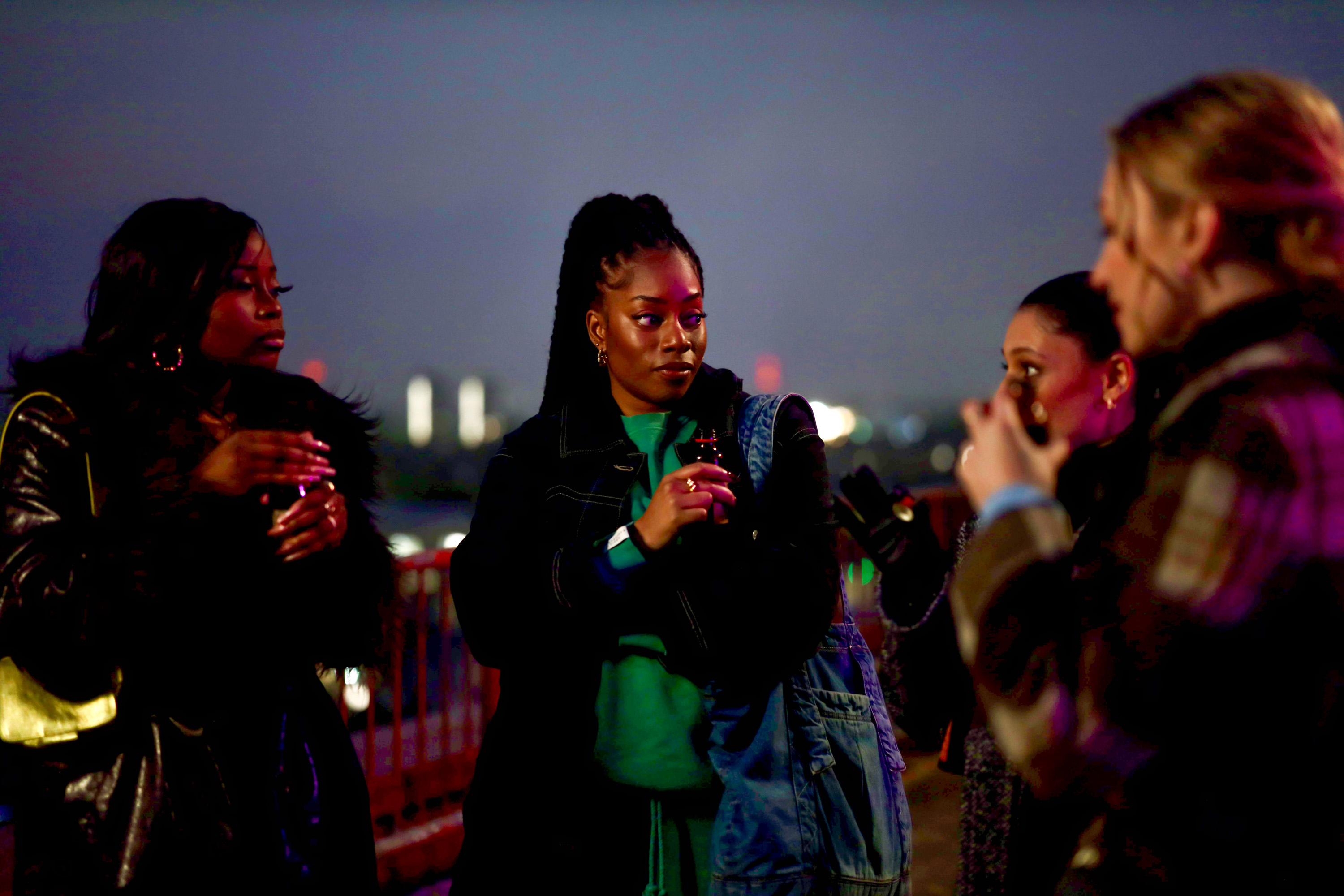
Kyazike (Bellah), Queenie (Dionne Brown), Cassandra (Elisha Applebaum), and Darcy (Tilly Keeper) drink on a rooftop in Queenie episode 3.
MC: You've previously been open about how hard it was to stay true to the authenticity of Queenie while creating a TV show. Were there any aspects that you really had to fight for going from page to screen?
Get exclusive access to fashion and beauty trends, hot-off-the-press celebrity news, and more.
CCW: I think it was just making sure that Queenie existed in the way that I intended her to. When you are writing a novel, it's you and your editor, and your editor wants your world to be your world. They want to just help you reframe it and make sure everything makes sense. But in TV, you have different stakes. There are different budgets; there are different ways of seeing characters. You want to make sure that people are always tuning in. So I guess the main conversations were around me protecting Queenie and the way that she was, and the decisions that she made in some ways—just making sure that she stayed authentic to the Queenie of the book, but also the Queenie of my politics. That was really important to me.
MC: There are some changes from the book to the show, especially with Kyazike’s cousin Frank becoming a regular character and his romantic interest in Queenie. I love the character and his very natural chemistry with Queenie, but what made you decide to add that romantic element to their friendship?
CCW: Everyone loves Frank. It's not just you. Get in line, get in line. Frank kind of appears in the novel. He’s Queenie’s best friend Kyazike’s cousin. He asks Queenie to dance, and Queenie essentially has a stomachache, because it's very stressful to have someone be very kind to her and feel seen by someone. I wanted to explore that properly. I guess I'd seen so much stuff about Black love on TV by this point, especially coming from America—Insecure does it constantly—and I was like, 'I want to do that too. Let's see what it looks like.'
In the writing of Frank, he felt really easy. He is made up of a lot of men that I've known and that I know now, but he's not one particular person. He represents this sort of modern Black man who is from Britain. He's a hustler, right? He has this van, and he will do anything. But also, he does see Queenie. He is caring, but he's not perfect and that was important, too. I wanted to explore that for both of them. I wanted to see a character I hadn't seen on TV for Black men, and that was really important to me. I've been in the privileged position of bringing to screen people that I want to see and I want to explore, and Frank really represented that. Samuel Adewunmi did the most incredible job. I think his performance is pretty flawless, and I could not have asked him for anything more.
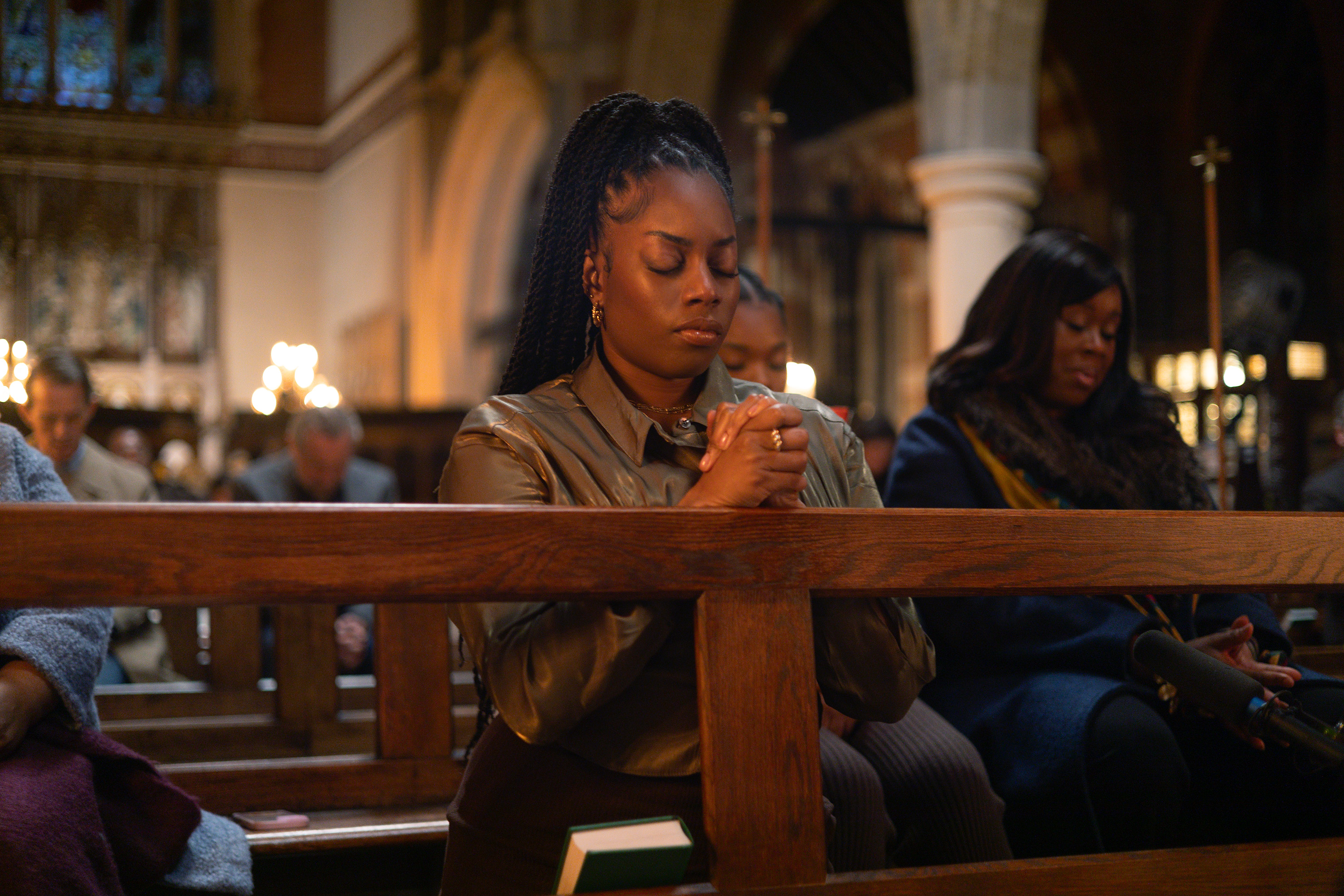
From left: Queenie (Dionne Brown) prays with her cousin Diana (Cristale De'Abreu) and aunt Maggie (Michelle Greenridge) in Queenie episode 4.
MC: What was the process like for selecting the music in Queenie?
CCW: I would write songs into the script so when you were reading it, [so] you could understand the tone. You were encouraged to go and have a listen, and see what Queenie was listening to. What Queenie was feeling, we should be feeling too through the music, because music says everything to me. We'd play some of the songs on set, but it was really in the edit where some of that music came to life, and we'd change things and chop things around.
Most importantly, I worked with a producer called Swindle on the score on both Queenie and Champion. We had the most incredible relationship. We both basically spoke in musical terms all the time, and we were both up in the middle of the night sending each other references, and being like, 'Okay, what do you think of this?' He was able to bring this really beautiful, cohesive sound to the entire show that takes us from the beginning and graduates and moves with Queenie. In the last three episodes, we have one sonic theme. Every time I think about it, I get chills or I'm in tears. What we do with music and emotion [on Queenie], I don't think I could have done with words, I don't think anyone could have done with acting. I think music is its own thing and for as long as I work, I will always make sure that music is one of the most important things to me.
I hope people are moved by Queenie's story, and the love that people have for her.
MC: Champion is an original series you created that wasn't adapted from a novel. When it comes to your stories, how do you decide which would work better as books, such as your 2022 novel People Person, and which are better as visual media?
CCW: I think that everything can be moved and changed around. I think that as long as I'm writing, I could make People Person a film, I could make it a TV show. It just depends on what I want to do at this point. I would say Queenie felt like it would be a TV show because there's so much. I thought it would be really difficult to squeeze it into 90 or 100 minutes.
Champion, for me, felt like a quick passion project, like a fever dream. I was doing it while I was working on Queenie, and then I moved immediately onto Queenie as soon as Champion was done. I think one day I'll look back and be like, 'Oh yeah, you created like a whole 'nother TV show and a soundtrack.' It was super difficult but also super rewarding. I was happy to put it to bed because it wasn't in my plans. It wasn't in my kind of world, or the things I wanted to say and do, but I was really glad that I got to say and say and do what I did in Champion. I'm really happy.
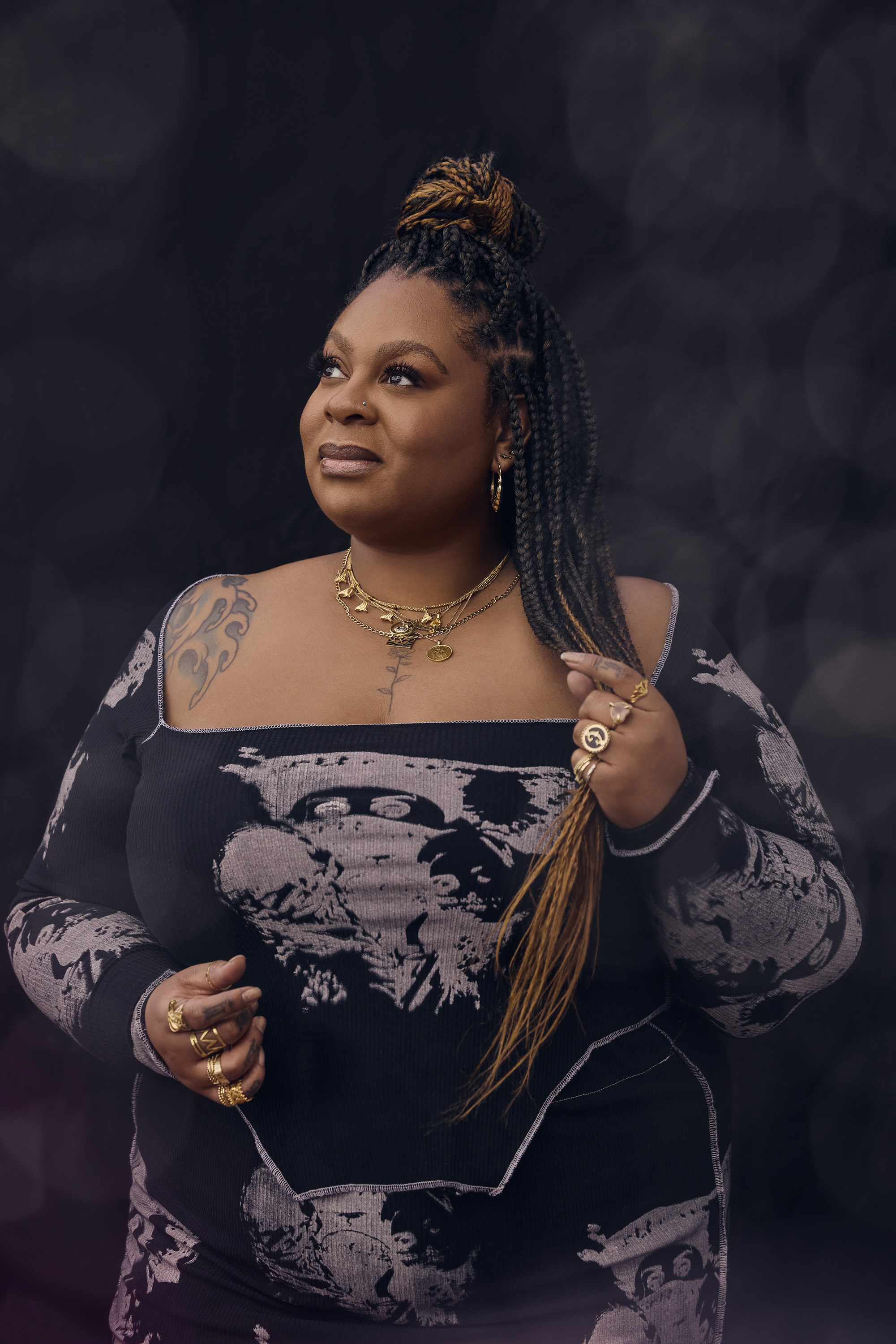
Showrunner Candice Carty-Williams says she fought to make sure that the novel adaptation "stayed authentic to the Queenie of the book, but also the Queenie of my politics."
MC: Especially Champion’s storyline about rapper Bosco's mental health was extremely important to put on TV.
CCW: Thank you. Obviously, it ends in a way where things are not settled at all for Bosco. Things are actually quite the opposite. The difference between Bosco and someone like Queenie is that we see that Queenie starts trying to do the work, but Bosco is just in a different place. For Black men, mental health is a very different thing. There are very different support systems, and maybe sometimes they're non-existent. It was important for me to talk about it, but the thing that I was saying with that is that there's still a long way to go in our community and looking after people in that way.
MC: Queenie the novel has been so important for so many women who have gone through similar mental health struggles. Now that the show is introducing the story to a whole new audience of non-book readers, what do you hope that new viewers will take away from the story?
CCW: I never set out to tell anyone what to think, but I do set out to move people. I hope people are moved by Queenie's story. I hope people are moved by the love that people have for her. She's someone who doesn't feel loved, isn't always loved in the right way, and didn't come from love necessarily, but she has made her way to finding love around her. I want people to see that, and to see what happens when Queenie says that she's happy, and all of her friends share a look. I want people to see where Queenie has come from, and to understand that she came from something that should have been love, but that was taken away.
Also this idea of the "strong Black woman," I want people who watch it to understand what it means to be living to that expectation and constantly be trying to strive for perfection—because, ultimately, it's impossible and not something that I think that we need to do. If there is one thing to take from it, it's that we don't have to be strong. We can only do what we can do. It was really important to me that Queenie as a character was always kind. She wasn't mean; she wasn't nasty. She doesn't call up Kyazike to bitch about someone. She has a lot of stuff happen to her and isn't necessarily looked after by the people who are meant to care about her, but she still finds a way to do her best and be kind. I think we could all do with a bit more of that.
This interview has been edited and condensed for clarity.
Quinci LeGardye is a Culture Writer at Marie Claire. She currently lives in her hometown of Los Angeles after periods living in NYC and Albuquerque, where she earned a Bachelor’s degree in English and Psychology from The University of New Mexico. In 2021, she joined Marie Claire as a contributor, becoming a full-time writer for the brand in 2024. She contributes day-to-day-content covering television, movies, books, and pop culture in general. She has also written features, profiles, recaps, personal essays, and cultural criticism for outlets including Harper’s Bazaar, Elle, HuffPost, Teen Vogue, Vulture, The A.V. Club, Catapult, and others. When she isn't writing or checking Twitter way too often, you can find her watching the latest K-drama, or giving a concert performance in her car.